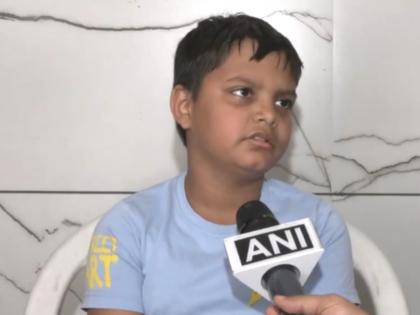'Recite Kalma Three Times': Surat Victim's Son Ordeal Describes Horrors of Pahalgam Terror Attack
By Lal Mohmmad Shaikh | Updated: April 24, 2025 16:15 IST2025-04-24T15:58:02+5:302025-04-24T16:15:22+5:30
The atmosphere across the country remains grim following the gruesome terrorist attack in Jammu and Kashmir's Pahalgam that claimed ...

'Recite Kalma Three Times': Surat Victim's Son Ordeal Describes Horrors of Pahalgam Terror Attack
The atmosphere across the country remains grim following the gruesome terrorist attack in Jammu and Kashmir's Pahalgam that claimed the lives of 26 tourists, along with Shailesh Kalthia, a native of Varachha area of Surat city, was also the victim of the terrorist firing on April 22. A chilling story of the attack has emerged from the young survivor, five-year-old Naksh Kalthia. Naksh, who witnessed the horrifying incident, recounted the events with heartbreaking clarity. "The terrorists asked the men to recite 'Kalma' three times...," the child said. "They didn’t let my father speak. He was in the front, and I didn’t see when he was shot."
Also Read | Indian Citizens With Valid Visas Denied Entry Into Pakistan at Attari-Wagah Border; Video Goes Viral.
He described how the family had gone to Pahalgam, Kashmir, and visited five locations, including the famous Baisaran meadow, often referred to as 'Mini Switzerland'. "We had been there for 10 to 15 minutes. When we got hungry, we sat down to eat. Suddenly, we heard gunshots. At first, we thought something had happened nearby. We asked the restaurant staff, but they didn’t know anything either."
Naksh continued, "Soon, we realised terrorists had entered the area, so we hid. But they found us. We saw two terrorists. I heard one of them ordered all the men to separate into Muslims and Hindus, and then shot all the Hindu men." He shared that the terrorists asked people to recite the Kalma three times. "The terrorists asked the men to recite 'Kalma' three times... All those who could not recite it were shot," Naksh said.
After the attackers left, local residents came and told the survivors to move downhill immediately. "I was on a horse, so I got down. My mother and sister climbed down from the mountain. Once we reached the base, the army arrived. It took around an hour and a half for them to get there. There was an army camp below, where we stayed for some time. That evening, we returned to the hotel."
5-Year-Old Survivor Recounts Chilling Ordeal of Pahalgam Terror Attack That Killed His Father
Describing the moment of the attack, Naksh said, "There were at least 20–30 people there, all Hindus. I was at the back. My father was in the front, followed by my mother and sister. I didn’t see my father get shot. One of the terrorists had a white beard, wore a hat, a white T-shirt, and black jeans. He had a camera mounted on his head. They let women and children go, but shot everyone else."
Shailesh Kalthia, one of the three Gujaratis killed in the Pahalgam terror attack, was laid to rest in Surat. His final rites attended by hundreds of people, including Union Minister and Gujarat BJP President C.R. Patil. During his farewell, his wife Shitalben, who witnessed his husband's killing, expressed her anger. She criticised the government's VIP culture.
“There’s nothing there, no army, no police, no facilities. But when VIPs or big leaders visit, there are dozens of cars, helicopters flying overhead. Who pays for all that? Us—the common people, the taxpayers. So why is all that service only for the VIPs and not for regular folks like us?” Shitalben asked, reported The Indian Express.
While crying, she also recounted the incident, saying she was shouting from the army camp below and begging them to go up and help the injured people. People came down, falling and running, but no help reached the injured people who were still up there. "So much happened up top—why didn’t the army below know anything?” she asked.
Open in app